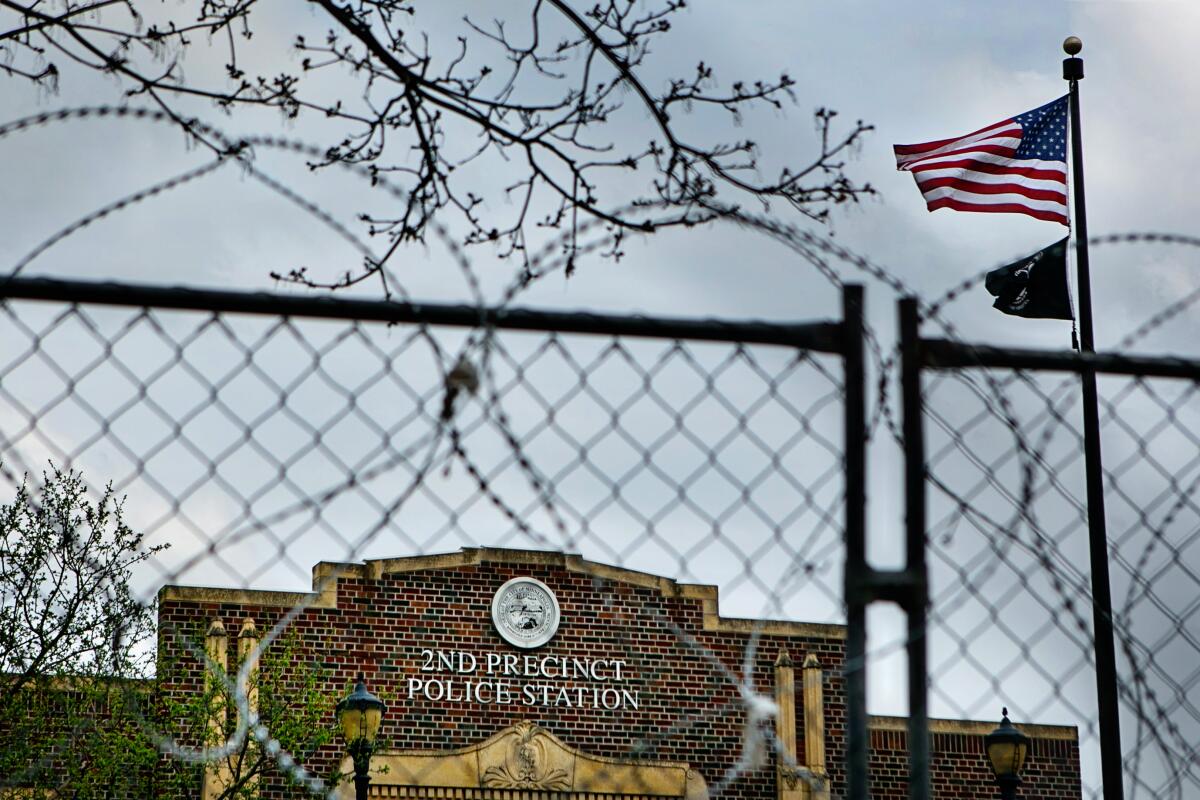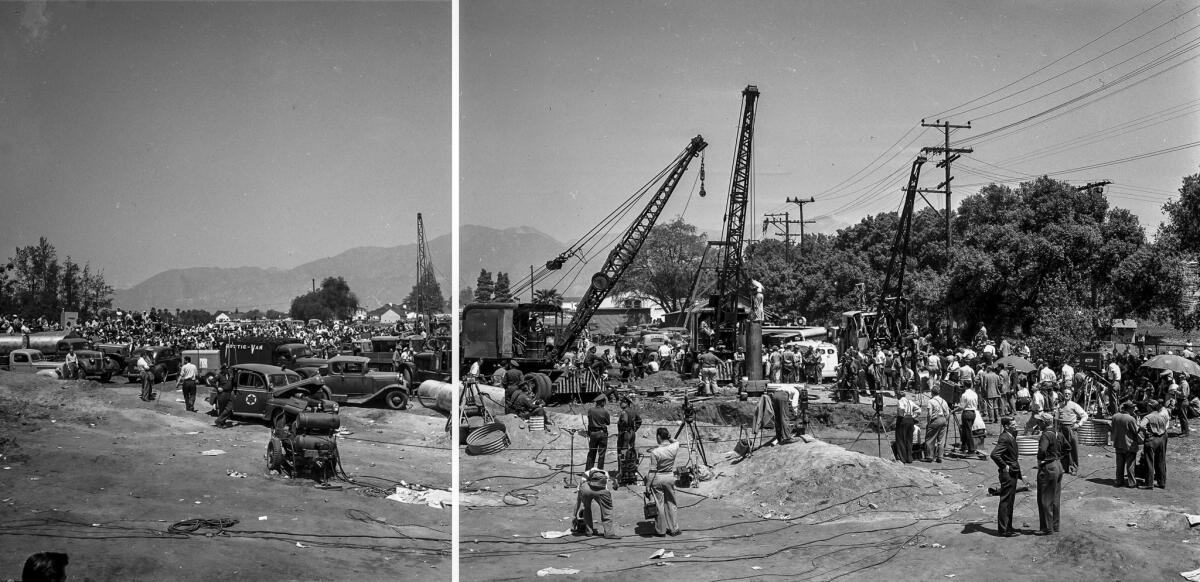Today’s Headlines: What is the future of policing?

- Share via
Cities are grappling with how to change police departments. As Minneapolis shows, there are no easy answers.
TOP STORIES
What Is the Future of Policing?
As testimony in former Police Officer Derek Chauvin’s murder trial enters its third week and tensions rise over a police shooting in a nearby city, Minneapolis once again finds itself at the forefront of a debate seared with a legacy of racial injustice: What is the future of policing in America, and what’s the best way to get there?
Many people agree that policing needs to change — it’s impossible to watch the video of George Floyd’s final breath and think otherwise, they say — but they’re split on how that should happen, especially in the aftermath of nationwide demonstrations that demanded departments reform even as they angered many police officers who felt unfairly vilified.
Start your day right
Sign up for Essential California for the L.A. Times biggest news, features and recommendations in your inbox six days a week.
You may occasionally receive promotional content from the Los Angeles Times.
Is the answer less taxpayer money and fewer officers on the streets? Or would more officers — people with ties to the communities they patrol — improve things?
In Minneapolis, a majority of the City Council pledged to dismantle the Police Department in June. But in the weeks that followed, some residents criticized the plan, arguing that it felt deeply out of sync with their lived realities, especially as the region experienced an increase in violent crime. Now, the outcome of the Chauvin trial could play a large role in what happens next.
Another Alarming Milestone
The COVID-19 death toll in California has exceeded 60,000, a milestone that comes even as conditions in the state continue to improve. The state’s toll represents 10.7% of COVID-19 deaths nationwide. California is home to about 12% of Americans.
Although California’s death toll was lower per capita than in the other most populous states, COVID-19 has hit some communities particularly hard. The state’s lower-income Latino communities — home to many essential workers who often live in crowded housing — saw disproportionately high numbers of deaths while affluent areas saw lower numbers.
Still, California has achieved significant progress in slowing the spread of the coronavirus. Deaths and hospitalizations have plummeted, and the state has so far avoided the spring resurgence that has hit other parts of the U.S.
Beginning Thursday, all Californians age 16 and up will be eligible for the COVID-19 vaccine. Some health systems and local governments, such as city-run sites in Los Angeles, have moved even faster to open vaccine appointments. But officials warned that supplies will remain limited for at least the next two weeks.
More Top Coronavirus Headlines
— The Supreme Court, citing religious liberty, has lifted another of California’s COVID restrictions. It held the state may not prevent people from gathering in homes for Bible study and prayer meetings.
— Burbank put up a chain-link fence around a restaurant that has repeatedly defied county health orders during the COVID-19 pandemic. The owner remains defiant.
— In a rare admission of the weakness of Chinese COVID-19 vaccines, China’s top disease control official says their effectiveness is low and the government is considering mixing them to give them a boost.
Doubling Down on Coal
Mexico’s populist President Andrés Manuel López Obrador took office in late 2018 and started turning back the clock on energy production.
He stopped new renewable energy projects, mocked wind farms as “fans” that blight the landscape, and poured money into the state oil company Petroleos Mexicanos. Last month, he pushed legislation that requires that the energy grid first take power from state-run plants — fueled in large part by crude oil and coal — before less expensive wind and solar energy.
López Obrador’s devotion to fossil fuels and rejection of cleaner energy at a time when most nations are moving in the opposite direction have dismayed environmentalists, as well as business leaders. Experts say his policies are rooted less in climate change denialism and more in nationalism and nostalgia.
College Admissions Heartbreak
Thousands of families and high school seniors are wondering what it takes to get into a University of California campus. It’s the byproduct of a college admissions season like no other — one marked by pandemic isolation, remote learning, disrupted activities and the elimination of standardized testing requirements at most universities across the country.
A big increase in college applications has been hailed as a sign that the dropping of testing requirements has lowered entry barriers for many students. But the flip side of more applications is more rejections and heartbreak — as well as widespread confusion over what it takes to get that coveted acceptance letter.
UC admissions officers say the unusual year has presented myriad challenges. But some decision-making insights emerged. Among them: Majors matter.
OUR MUST-READS FROM THE WEEKEND
— As protesters on the left and right target public servants at home, the city of Sacramento has begun pushing back.
— Speaking of Sacramento, L.A. should take a lesson from that city on how to clear a homeless encampment, writes columnist Erika D. Smith.
— Five poets address the complications of calling L.A. home.
— “Hiking after a miscarriage, grief walks with me.”
FROM THE ARCHIVES
On April 8, 1949, 3-year-old Kathy Fiscus fell into an abandoned well in San Marino and was trapped 90 feet below ground in a pipe 14 inches wide.
The ensuing rescue attempt gripped Southern California. As workers dug, calls offering advice and help flooded police stations, newspaper offices, radio and TV stations. A crowd gathered at the site, as the efforts to free the girl grew increasingly desperate.
“They brought Kathy out of the pipe on Palm Sunday. It fell to the doctor who had delivered her to announce to the world that she had died not long after she fell in,” The Times’ Patt Morrison wrote in a 1999 story recounting the tragedy.
The incident ushered in an era of live television coverage of news and would later lead to laws in California and other states requiring the sealing of abandoned wells.

CALIFORNIA
— A crowd of White Lives Matter protesters and anti-racism counterprotesters filled the streets near the Huntington Beach pier, but they quickly dispersed after police declared an unlawful assembly amid increasingly hostile clashes.
— A woman arrested in connection with the slaying of her three children at their Reseda apartment was embroiled in a child custody dispute, according to the children’s father and court documents.
— The descendants of a Black family that once owned a thriving oceanfront resort in Manhattan Beach could get the property back under state legislation announced Friday.
— Internal affairs investigators reviewing hundreds of allegations of misconduct and excessive force by other L.A. police officers during last summer’s mass protests against police brutality are ruling on the side of the officers in most cases.
Support our journalism
Subscribe to the Los Angeles Times.
NATION-WORLD
— Iran described a blackout at its underground Natanz atomic facility as an act of “nuclear terrorism,” raising regional tensions as world powers and Tehran continue to negotiate over its tattered nuclear deal.
— The Biden administration has flown roughly 2,000 asylum seekers — all families with children — from Texas to San Diego and expelled them from the U.S. to Mexico without giving them a chance to request protection.
— Voters in Ecuador appeared to turn to a conservative businessman in a presidential runoff election, rebuffing a leftist movement that has held the presidency for more than a decade.
— Donald Trump used a speech before Republican donors to go after Senate Minority Leader Mitch McConnell; McConnell’s wife, Elaine Chao, who was Trump’s Transportation secretary; and his vice president, Mike Pence.
HOLLYWOOD AND THE ARTS
— Chloé Zhao’s “Nomadland” continued its tour of dominance through awards season, with Zhao taking top honors at the Directors Guild of America Awards, and the film winning four prizes, including best picture, at the British Academy Film Awards.
— The portrayal of racist violence in Amazon’s new series “Them: Covenant” left executives shaken. Does it go too far?
— Hollywood has long rewarded, even encouraged, monstrous behavior. And the bullies won’t be stopped until the mythmaking around them stops, columnist Mary McNamara writes.
— Kevin Powell was half of “the most famous argument” in reality-TV history. Time proved him right.
BUSINESS
— Confused about filing taxes this year? You’re not alone. The COVID-19 pandemic, along with the life changes and government relief measures it triggered, has made things extra complicated. But at least there’s extra time.
— Low-fare Avelo Airlines will launch this month, flying out of Hollywood Burbank Airport. Is now really the best time to start a new airline?
SPORTS
— Hideki Matsuyama made history by becoming the first Japanese player to win the Masters golf tournament.
— Football finally returned to the entire City Section. Columnist Eric Sondheimer recounts the historic night.
For more high schools sports, sign up for Sondheimer’s free newsletter, Prep Rally.
Free online games
Get our free daily crossword puzzle, sudoku, word search and arcade games in our new game center at latimes.com/games.
OPINION
— California has a golden opportunity to narrow racial health disparities, The Times’ editorial board writes.
— How to save beaches and coastlines from climate change disasters: Focus on natural infrastructure, writes Michael W. Beck, a research professor in the Institute of Marine Sciences at UC Santa Cruz.
WHAT OUR EDITORS ARE READING
— In the early 2040s, Trump-appointed chief judges are on track to simultaneously sit atop nearly every appeals court in the U.S. (The Atlantic)
— A photographer explains what really happened when Queen Elizabeth II was snapped “giggling” at Prince Philip. (BBC)
ONLY IN L.A.
On Friday, the Dodgers returned at last to Dodger Stadium for a game played in front of real live fans — and to celebrate having won a World Series for the first time in 32 years. Players and coaches from the 2020 championship club were rewarded with an 11-carat championship ring that features 285 dazzling diamonds and Dodger-blue sapphires, a yellow-gold Commissioner’s Trophy and a classic red, white and blue team logo. The box that it comes in has its very own LCD screen with highlight video.
Comments or ideas? Email us at headlines@latimes.com.
Sign up for Essential California
The most important California stories and recommendations in your inbox every morning.
You may occasionally receive promotional content from the Los Angeles Times.



